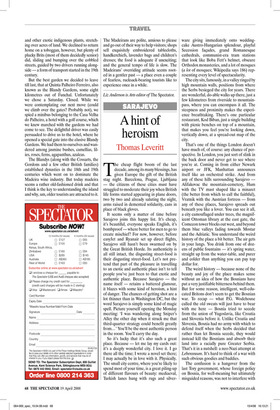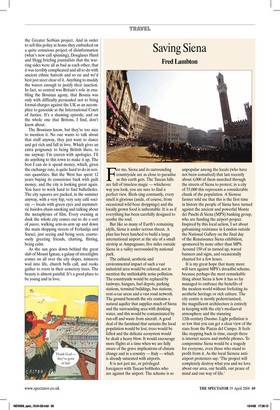A hint of heroism
Thomas Leveritt
The cheap flight boom of the last decade, among its many blessings, has given Europe the gift of the British stag night. Barcelona, Prague, Ljubljana — the citizens of these cities must have
1 Pa
struggled to moderate their joy when British life forms started appearing in plane doors, two by two and already saluting the night, arms raised in demented solidarity, cans in place of black gloves.
It seems only a matter of time before Sarajevo joins this happy list. It’s cheap, it’s beautiful, everyone speaks English, it’s bombproof — where better for men to go to create mischief? For now, however, before easyJet and Ryanair set up direct flights, Sarajevo still hasn’t been swarmed on by the Great British Horde. Its authenticity is all still intact, the disgusting street-food is their disgusting street-food. Let’s not pretend that part of the pleasure in travelling to an exotic and authentic place isn’t to tell people you’ve just been to that exotic and authentic place. Because Sarajevo — the name itself — retains a battered glamour, it blazes with some kind of heroism, a hint of danger. The chances of getting shot are a lot thinner than in Washington DC, but the word Sarajevo is simply some kind of magic spell. Picture yourself opening the Monday meeting: ‘I was wandering along Sniper’s Alley the other day when it struck me that third-quarter strategy could benefit greatly from...’ You’ll be the most authentic person in the room. You’ll carry the day.
So it’s lucky that it’s also such a great place. Because — let me lay my cards out: it’s a deeply wonderful city. I love it. I go there all the time; I wrote a novel set there; I may actually be in love with it. Physically. The small city centre, where you’re likely to spend most of your time, is a great piling-up of different flavours of beauty: mediaeval, Turkish lanes hung with rugs and silver ware giving immediately onto weddingcake Austro-Hungarian splendour, playful Secession façades, grand Romanesque cathedrals, communist-era tram stations that look like Boba Fett’s helmet, obscure Orthodox monasteries, and a lot of mosques (a lot of mosques; Wikipedia says 186) representing every level of spectacularity.
The city sits, famously, in a valley ringed by high mountain walls, positions from where the Serbs besieged the city for years. There are wonderful, do-able walks up there, just a few kilometres from riverside to mountainpass, where you can encompass it all. The steepness and proximity makes the experience breathtaking. There’s one particular restaurant, Kod Biban, just a single building with picnic benches on top of a mountain, that makes you feel you’re looking down, vertically down, at a spread-out map of the city.
That’s one of the things London doesn’t have much of, of course: any chance of perspective. In London, you just sort of slink in the back door and never get to see where you’re at. Coming in from either Newark airport or JFK, Manhattan announces itself like an orchestral strike. And from any of these hills surrounding Sarajevo — Alifakovac the mountain-cemetery, Hum with the TV mast shaped like a minaret (the better from which to call the faithful), Vratnik with the Austrian fortress — from any of these places, Sarajevo spreads out beneath you like a lover. You can see it all, a city camouflaged under trees, the magnificent Ottoman library at the east gate, the Comecon tower blocks out west, and beyond them blue valleys fading towards Mostar and the Adriatic. You understand the weird history of the place a bit better. The air gets in your lungs. You drink from one of dozens of public fountains — it’s spring water, straight up from the water-table, and purer and colder than anything you can pay top dollar for.
The weird history — because none of the beauty and joy of the place makes sense without an idea of how the Bosnians have put a very justifiable bitterness behind them. But for some reason, intelligent, well-educated Britons don’t seem to get the Bosnian war. To recap — what P.G. Wodehouse called the old sweats will just have to bear with me here — Bosnia tried to secede from the union of Yugoslavia, like Croatia and Slovenia before it. Unlike Croatia and Slovenia, Bosnia had no army with which to defend itself when the Serbs decided that rather than let Bosnia secede, they would instead kill the Bosnians and absorb their land into a racially pure Greater Serbia. That’s it in a nutshell: a neo-Nazi attempt at Lebensraum. It’s hard to think of a war with such obvious goodies and baddies.
The confusion is a hangover from the last Tory government, whose foreign policy on Bosnia, for well-meaning but ultimately misguided reasons, was not to interfere with the Greater Serbian project. And in order to sell this policy at home they embarked on a quite conscious project of disinformation (what’s now call spinning), Douglases Hurd and Hogg briefing journalists that the warring sides were all as bad as each other, that it was terribly complicated and all to do with ancient ethnic hatreds and so on and we’d best just steer clear of it. Anything to muddy the waters enough to justify their inaction. In fact, so central was Britain’s role in enabling the Bosnian agony, that Bosnia was only with difficulty persuaded not to bring formal charges against the UK as an accomplice to genocide at the International Court of Justice. It’s a shaming episode, and on the whole one that Britons, I find, don’t know about.
The Bosnians know, but they’re too nice to mention it. No one wants to talk about that stuff anyway, they just want to dance and get rich and fall in love. Which gives an extra poignancy to being British there, to me anyway: I’m craven with apologies. I’ll do anything to this town to make it up. The best I can do is spend money, which, given the exchange rate, is quite hard to do in serious quantities. But the West has spent 12 years buying its conscience back with guilt money, and the city is looking great again. You have to work hard to find bulletholes. The city squares are packed, in the summer anyway, with a very hip, very sexy café society — locals with green eyes and asymmetric hairdos chain-smoking and talking about the metaphysics of film. Every evening at dusk the whole city comes out to do a sort of paseo, walking arm-in-arm up and down the main shopping streets of Ferhadija and Saraci, just seeing and being seen, courteously greeting friends, chatting, flirting, being calm.
As the sun goes down behind the great slab of Mount Igman, a galaxy of streetlights comes on all over the city slopes, minarets wail into life, church bells call, and rooks gather to roost in their cemetery trees. The beauty is almost painful. It’s a good place to be young and in love.



















































































 Previous page
Previous page